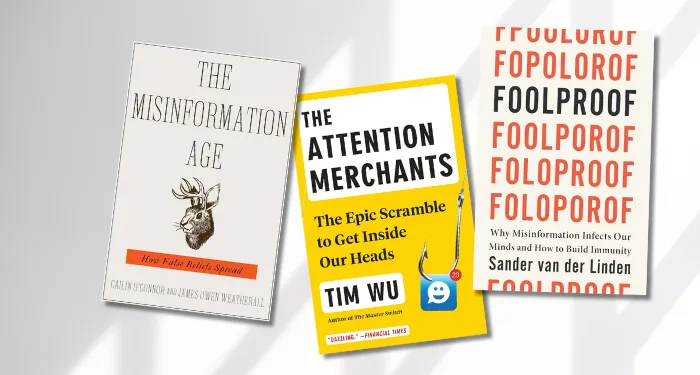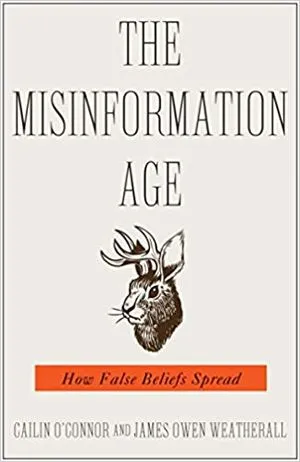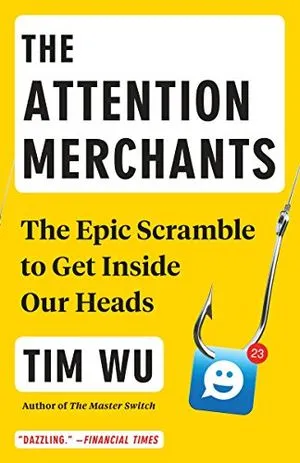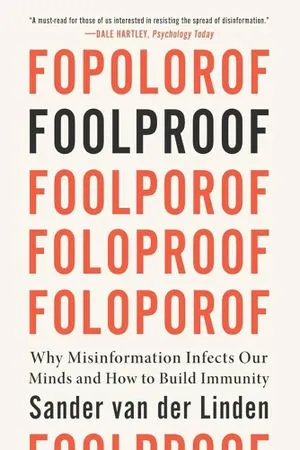
There’s Never Been a Better Time to Pick Up a Book About Media Literacy
I don’t need to tell you that we’re living in an unprecedented moment of disinformation, misinformation, and conspiracy theories. While lies, spin, and conspiracies have always been a part of media, it’s frightening how quickly they can spread and how big their effects can be now. Elections can be decided based on voting informed by misinformation. Conspiracy theories spread on Facebook helped to drive the January 6th Capitol attack. Disinformation has seeped into every part of our online discourse — hijacked by those who want to steer political conversations by force.
In the same way that no one thinks they’re influenced by ads, but they somehow continue to be an almost trillion(!) dollar industry, most people feel confident that they can spot misinformation and disinformation in media — and most people are wrong. I believe you’re an intelligent person; you are reading Book Riot, after all! But we’re all subject to our own biases and cognitive shortcuts, which means we can easily miss mis- and disinformation, especially when it’s tailored to our existing beliefs.
Luckily, we can “vaccinate” ourselves against misinformation by learning more about these tactics. That’s why task #17 of the 2024 Read Harder Challenge is “Read a book about media literacy.” These books can help you tune up your media literacy skills so you’re better prepared to spot bias, mis- and disinformation, conspiracy theories, fallacies, and more in our discourse — both online and in person.
Your first test will be selecting which book(s) to read: what makes each author a credible source? Do they have expertise in this field? What are their biases? While you’re reading, don’t take what you’re reading as gospel; interrogate whether their claims make logical sense and whether their sources are reputable.
Book Riot is hiring! We’re looking for a full-time temporary Ad Operations Associate. Check out the listing for more information. We’re looking forward to working with you!

The Misinformation Age: How False Beliefs Spread by Cailin O’Connor and James Owen Weatherall
Let’s start out with some broad background on misinformation. In this 2020 book by two philosophers, they explore why people believe things that aren’t true, how misinformation spreads, and why truth still matters — which is a wild thing to have to argue, but that’s the era we’re living in! The Misinformation Age also includes scientific case studies to show how results are misinterpreted once they hit headlines. It comes recommended by Scientific American, New York Times Book Review, and Kirkus Reviews. This doesn’t have examples from the last few years, but since the focus is more broad, that shouldn’t be a deterrent.

The Attention Merchants: The Epic Scramble to Get Inside Our Heads by Tim Wu
Tim Wu served as Special Assistant to the President for Technology and Competition Policy from 2021 to 2023 and is currently a law professor at Columbia University. He also coined the term “net neutrality.” In this 2017 book, Wu offers some historical context to our new economy of attention, tracing its origin to newspaper sales and following its evolution up to now. Like The Misinformation Age, this isn’t up-to-date to 2024, but it offers context that is still relevant — and it reminds us why it’s important to be scrupulous about what we give our attention to.

Foolproof: Why Misinformation Infects Our Minds and How to Build Immunity by Sander van der Linden
With that background out of the way, let’s get into some tips on how to combat misinformation! This is the author who I linked to in the introduction: van der Linden offers evidence that we can “prebunk” misinformation in order to be better prepared to spot it in the wild. He is a Professor of Social Psychology at the University of Cambridge who also acts as an advisor to governments in combatting misinformation. The paperback came out this year, so this is a great up-to-date option.
Content for paid subscribers continues below.
Pro tip: if you’re having trouble finding media literacy books, searching for “misinformation,” “disinformation,” or even “fake news” books may bring up more results. Also, consider asking your local librarian for recommendations; they’re experts on the subject, and it will also check off task #9 of the Read Harder Challenge.
You might also be interested in How to Increase Your Information Literacy and What Is Media Literacy and How Can You Increase Your Own?
What are you reading for this task? Let’s chat in the comments!
Check out all the previous 2024 Read Harder posts here.
The comments section is moderated according to our community guidelines. Please check them out so we can maintain a safe and supportive community of readers.
- How To Pick Which Historical Fiction Book To Read Next
- New Maureen Johnson Mystery, British Serial Killer Procedural, 500+ Page Mysteries & More!
- Grammar Nerds, This Book Is for You
- Black Surrealism, Freedom, Spirituality, and Survival
- Spies Against the Confederacy in This New Historical Fiction
- A Dark, Twisted, Substantially Satisfying Fairytale
- Looking to Get Into Cooking? This Is The Book For You











